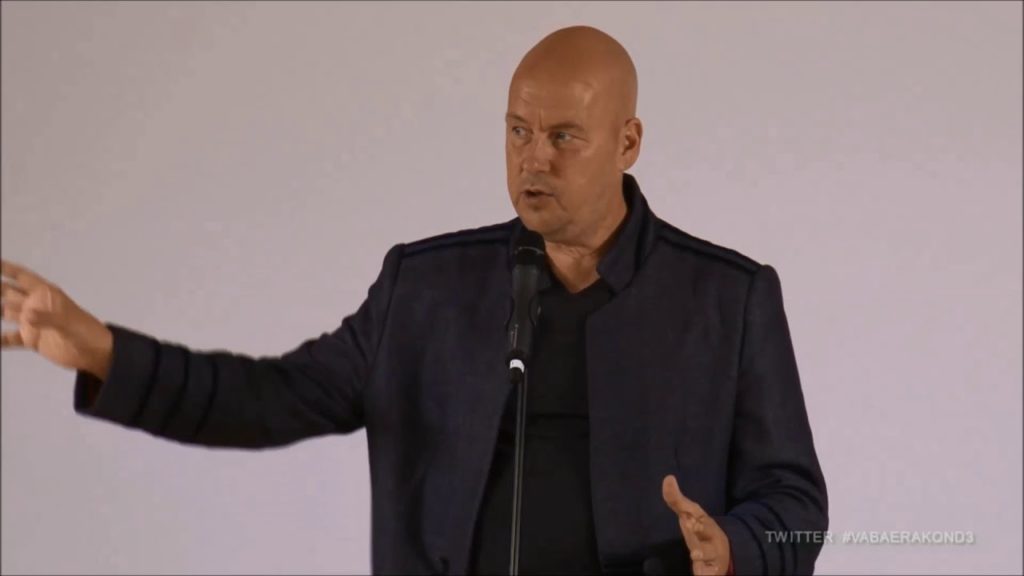21.11.2017 - 12:46
|
Actualització: 21.11.2017 - 16:52
MP Artur Talvik is the chairman of the parliamentary group in Estonia which monitors the Catalan case. He was an international observer in Catalonia on October 1, when the independence referendum was held. An actor and movie producer, Talvik produced The Singing Revolution, a film that explains Estonia’s independence process in 1992. Currently he is the president of Estonia’s centre-right party Eesti Vabaerakond (“Free Party”). In this telephone interview he compares both movements and tells us his own views on the Catalan government’s detention and exile, as well as the upcoming snap elections on December 21.
—In your opinion, what is going on in Catalonia?
—I am very concerned and saddened by the developments in Spain and Catalonia. In Estonia we speak of political prisoners. That is something I don’t like to see in the EU. I am very concerned. It makes me wonder about the future of Europe. You see, most European leaders are keeping quiet. This is the main problem.
—True. Half our government is in jail.
—I cannot understand that. When we talk about the rule of law, we must acknowledge that when the law is used to jail your political opponents, it is not a democracy. It is something else, but not a democracy. Like having websites shut down, for instance. In Estonia we asked the Prime Minister what he thought about web pages begin censored. Once again, his answer was that “it is a Spanish internal affair”.
—I was under the impression that Estonia’s government would be more sympathetic …
—The Estonian people are. Very, very much so. But our government is just watching. As far as I know, the Spanish government have a very aggressive lobby everywhere. Also here, in Estonia. At the moment Estonia holds the presidency of the EU. That is why I am putting pressure on my government, because they have a chance to do something meaningful to try to resolve the Catalan problem and stop the actions of the Spanish government. Or at least issue a warning. But, unfortunately, the Spanish lobby is stronger than this MP. The right to self-determination is one of the main principles of our free Estonia. It’s even mentioned in our constitution. So now that Catalonia wishes to exercise that right, our government keeps quiet? My friends, if we do not stand up for self-determination, then we are not standing up for Estonia’s independence.
—What is the position of Estonia’s media?
—There are two large media groups. One is rather unbiased. Unfortunately, the other is on Spain’s side.
—What initiatives have you had in the Estonian Parliament?
—Our Parliament is one of the first to have set up a group to support Catalonia. We created it eighteen months ago. When we heard that the Spanish authorities had deployed thousands of Guardia Civil and Police officers and had begun to arrest people in an attempt to locate the referendum’s ballot boxes, we wrote a letter to Rajoy. In our letter we asked him to solve the problem through dialogue. We had a reply from the Spanish ambassador. It was an angry letter. When we returned from Barcelona, we began to ask questions about internet freedom to the Foreign Minister and the PM. The Prime Minister, as I said, gave us a vague answer, despite the fact that Estonia holds the digital presidency of the EU and we should be supporting freedom on the internet. When my party, the Free Party, learned that both [grassroots leaders Jordi Cuixart and Jordi Sànchez] had been jailed, we sent an open letter to the Prime Minister asking him to act quickly, as head of the EU. And that political prisoners could not be tolerated. A few days ago he replied privately. It was a diplomatic response.
—What did he say?
—Nothing, nothing at all. Complete emptiness.
—We have elections coming up. After a number of years of political autonomy, now Catalonia is under Madrid’s direct rule. What should we do?
—You should forget your political differences. You should unite, like Junts pel Sí did [the Catalan coalition that won the last election] and persevere with the same peaceful determination and in the same vein. If you have a fair election, you will win, I think. On a TV debate here in Estonia I said that these elections were ridiculous. They will not solve the problem. If they are fair, independence supporters will win again. Or at least they will have a strong position. I mean to say that the problem must be resolved by holding talks and finding a way. How many times has Puigdemont tried that? Many.
—If the other side resorts to violence, what should we do?
—Fight like Gandhi used to. That’s what I like. In Estonia we had the Signing Revolution. It was not easy to stick to peaceful means and avoid provocations. There were many of those.
—In the case of Estonia, the people took to the streets. They surrounded buildings. Was that our mistake? Not taking to the streets to defend the Republic like you did?
—You can never make comparisons. But, indeed, I was one of those who rushed to defend the HQ of our radio station. And it got a bit hairy when the Russian tanks turned up.
—Any deaths?
—None. Nobody died in Estonia, unlike in Latvia and Lithuania. But not here. And we are proud of that. People occupied the streets and encircled buildings with cement, when necessary. It was like a war scene. But all situations are different. I am certain that you know your strategy. It’s very difficult for me to pass any advice. I’m not the right person.
—What should the EU do if the pro-independence parties win the upcoming elections?—Here’s something else I do not understand: the EU’s attitude. Europe’s stance on Turkey or Poland’s case is very different. The EU has stuck its nose in Poland’s affairs on many occasions. But now they’re keeping quiet. It’s hypocrisy. I don’t know what Rajoy has been saying in private. Has he threatened them with leaving the EU? Does he give arguments against the EU and threaten with a global collapse? Has he told them that Spain will follow Brexit’s lead? Is that his threat? If so, what about the EU’s defence of democracy, free speech and self-determination? What about all that? We cannot tolerate violence against peaceful voters. You cannot beat people up because they are voting for independence. That shouldn’t happen. But, unfortunately, it has.
—You were an international observer on October 1.
—I was in Catalonia with a group of foreign MPs and some of us had arrived a few days earlier. That’s why I was able to witness two marches ahead of the vote, one unionist, the other separatist. The latter was massive; the former, very aggressive. I was taken aback by unionists singing Francoist anthems. For me it was a shock to see Neo-nazis in the unionist demonstrations. The most exciting thing of all, though, was when we visited schools the night before the referendum [to be used as polling stations]. Everything had been set up in a very clever, very exciting way. I saw people speaking from the heart, not in a partisan way. I am a great admirer of civil society. And that was a great show of power by civil society.
—What are your memories of the day of the vote?
—Early in the morning, my Latvian colleague and I travelled to the polling station nearest our hotel. At 5 am we saw the human shields, made up of people of all ages. At one polling station we actually saw the ballot boxes arrive. The first shock came when the Spanish authorities had the internet connection shut down. Websites, too. The downside of that day came when a reporter showed me pictures of the first attacks by Spanish Police and Guardia Civil. That really upset me: it was a school which we had visited the day before! Our delegation was shocked. Then and there we understood that it would be a terrible day. We have understood that the Spanish government behaves in a non-European manner. Later we saw some of the people injured. A member of our group was even hit by a rubber bullet. The last thrill of the day came when I was sitting outside a polling station and Carme Forcadell walked in, fifteen minutes before closing time. She thanked the volunteers for their work. Finally that evening I also witnessed the ballots being counted inside the polling place. And I kept receiving news on my phone. That’s when I heard the words of the Estonian Foreign Affairs minister. It was my last shock. I was very angry. He said nothing about the Spanish police violence against peaceful people. He only spoke about a Spanish internal affair.
—How did Estonia react to those words?
—Most Estonians were very angry at their government after the MP’s statement. When I got back to Estonia, in parliament, I demanded an explanation for those cowardly words. I know the PM felt awful. But I didn’t like his answer at all. Not one bit.



